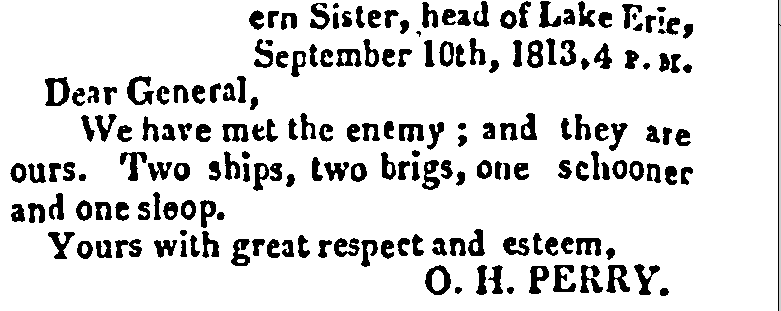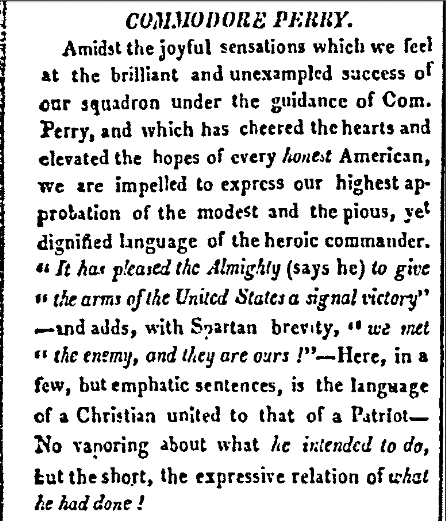“We have met the enemy and they are ours.”—O.H. Perry
A collection of old newspapers, like GenealogyBank’s Historical Newspaper Archives, is an essential resource for genealogists trying to find their family stories and capture the details of their ancestors’ lives. Old newspapers also help us better understand the times our ancestors lived in, and the events they were probably thinking about and discussing with their family and friends.
On this day in history, 10 September 1813: the tiny U.S. Navy defeated the mighty British Navy in a hard-fought battle on the waters of Lake Erie. Right after the fighting ended, American Commodore Oliver Perry wrote on the back of an old envelope his famous message to General William Harrison: “We have met the enemy and they are ours.”

During the 19th century the powerful British Royal Navy ruled the waves. However, during the War of 1812 one of the key clashes, the Battle of Lake Erie off the coast of Ohio, was a naval engagement in which the fledgling U.S. Navy completely defeated its British counterpart. On 10 September 1813 American Commodore Perry’s nine warships with 54 guns captured the entire British squadron of six warships with 61 guns led by Commodore Robert Barclay.
The nearly 3½ hour battle was hard-fought with similar casualties on both sides: the British lost 134 killed and wounded, the Americans 123. The battle did not start off well for the Americans, as Perry’s flagship Lawrence was badly damaged and most of its crew killed. He and his personal flag were rowed a half mile, while guns were roaring all around them, to take over the other large U.S. vessel, the Niagara. Perry dispatched the Niagara’s captain, Jesse Elliot, to command the smaller gunboats while he carried on the fight from the Niagara’s deck. Through sheer tenacity the Americans outfought the British, capturing all six ships and 306 men.
The American press quickly realized the significance of the morale-boosting victory.

The British had controlled Lake Erie since the outset of the war, and used this advantage to capture Detroit. However, after the Battle of Lake Erie the U.S. controlled the lake for the rest of the war, enabling them to recapture Detroit and prevail at the crucial Battle of the Thames.
Were any of your ancestors or relatives involved in the Battle of Lake Erie 200 years ago? If so, please share with us in the comments.
Explore over 330 years of newspapers and historical records in GenealogyBank. Discover your family story! Start a 7-Day Free Trial

John Hogarty
Notes by his granddaughter, Mary Ann Pew-Cornish:
“My grandfather, John Hogarty, was born in 1796, I think in the east central part of Ireland, near Dublin. When 14 years old, he was celebrating St. Patrick’s Day with other boys in the village when the press gang, a company of British soldiers, surrounded them and forced them into the army. As he was too young and too small to be put in the ranks as a soldier, he was put into the band and also made an officer’s valet. He never saw his father nor his mother nor his home again.
“Like all those of true Irish blood at that time he had an innate hatred for the British; moreover, he had never enlisted and since he hated the army life he determined to escape. In 1813, after 3 years in the British Army, he succeeded in his 3rd attempt and reached an American vessel engaged in the War of 1812. He entered the American Army against the British and again served in the band.
“He was with Commodore Perry at the Battle of Lake Erie and after the American victory on September 10, 1813, at Put In Bay when the British officers marched by to surrender their swords, his old Colonel saw him and exclaimed, ‘Ah, John, I never thought you’d leave me that way.’
“He had some interesting experiences as he traveled through Europe with the British Army during its campaigns against Napoleon. On one instance while in Russia he was out with a foraging party looking for food. They came to a house and asked for something to eat. The woman set food on the table, but no knives or forks, and when the men asked for them she said, ‘Fingers were made before forks!’ and she swept the food away. The poor hungry soldiers had to look elsewhere.
“After the close of the war of 1812 he settled at Sacketts Harbor, New York, and married Catharine Delaney.
“My mother Ann, the oldest of the family, was born there in 1823. There were two other daughters: Catharine (Mrs. John Day) and Mary (Mrs. Byron Winnegar); and three sons: Michael, Edward, and John. Edward was the father of John Hogarty, Chauncy Olcott’s manager for 25 years. John was drowned at 14 years at Green Bay, Wisconsin, where they had moved some time after my mother’s birth. My grandfather died there in 1844, the year I was born.
“I have heard my mother say that he was a handsome man resembling the picture of Noah Webster in a book we had called ‘Lives of Eminent Men.'”
Thanks for this fine addition to the story, Mark!